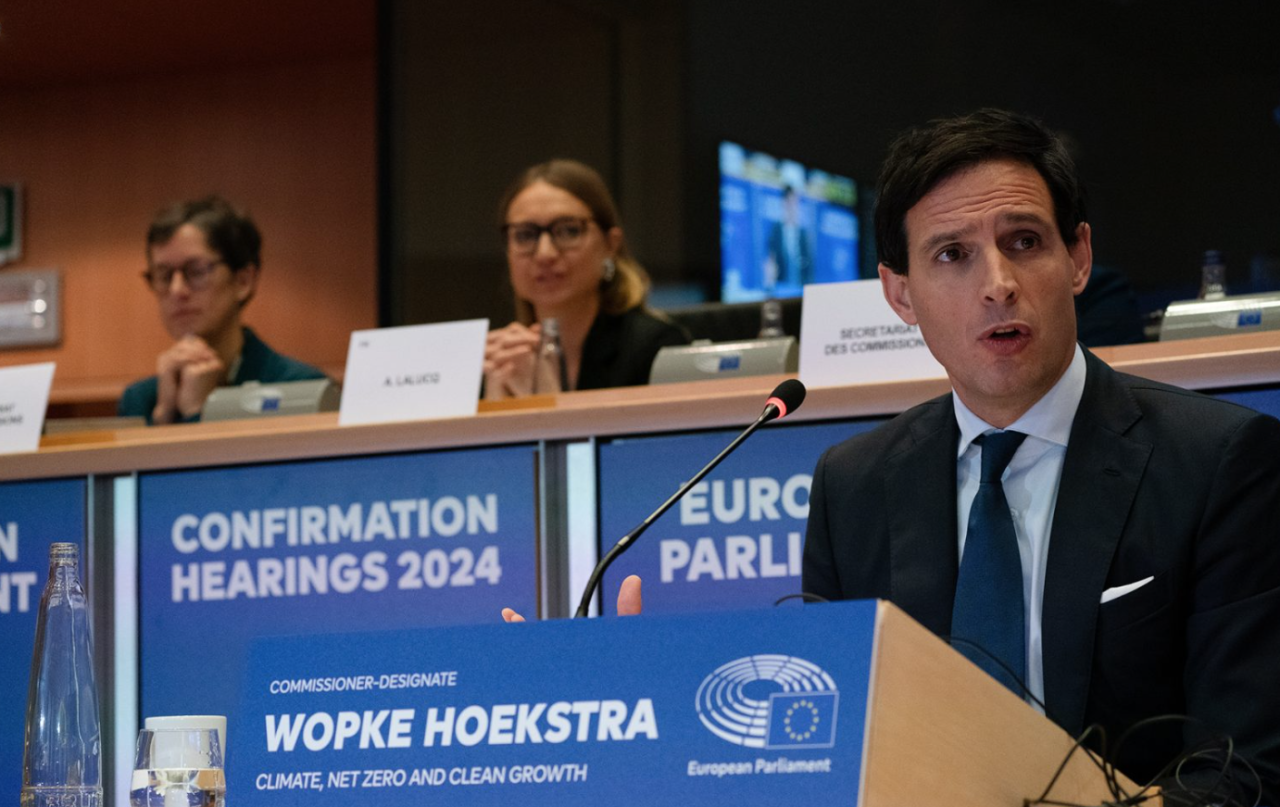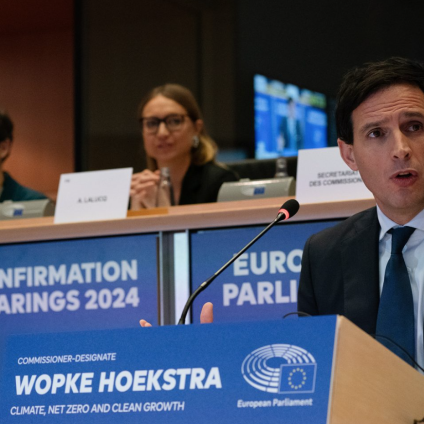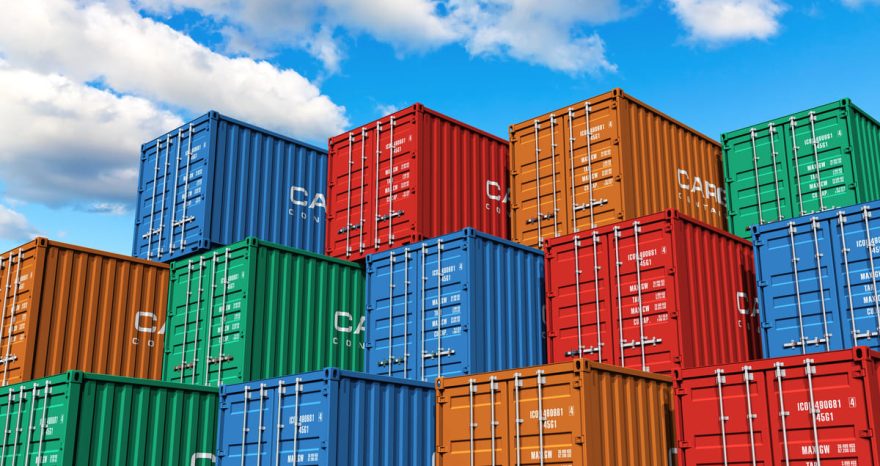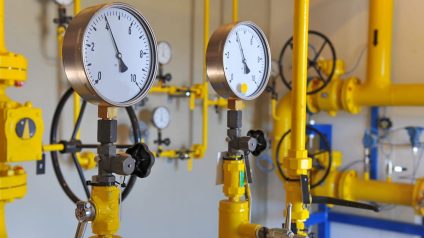Hoekstra firmly rejects revisiting the 2035 ban on diesel and gasoline vehicles or reopening the door to biofuels. Among his priorities are the proposed Clean Industrial Deal within 100 days, an EU adaptation plan, and a European initiative on taxation that incorporates 'green' aspects.

Maintain high ambition for emission reduction targets by 2040, keeping the -90% goal set in the previous legislature. Push for adaptation, including a European plan for adapting to the climate crisis. Ensure the competitiveness of European industry with a Clean Industrial Deal within the first 100 days, as previously announced by Ursula von der Leyen. No backtracking on the 2035 ban on diesel and gasoline cars. These are some of the political priorities outlined by the designated Climate Commissioner, Wopke Hoekstra, during his confirmation hearing at the European Parliament on November 7.
Who is Wopke Hoekstra?
Hoekstra succeeded Frans Timmermans during the previous European legislature, starting on October 9, 2023, inheriting some of the responsibilities of the former executive vice president of the European Commission, a key figure for the Green Deal.
After securing a second term at the helm of the European Commission, Ursula von der Leyen decided to reappoint the 49-year-old Dutchman for this position, although, as with all commissioners, responsibilities and functions have been reshuffled.
Hoekstra, formerly Minister of Finance and Foreign Affairs of the Netherlands, will continue to lead EU climate diplomacy, oversee mitigation and adaptation policies, and develop the European decarbonization strategy.
Among the new elements of his role, over the next five years, he will also handle taxation, as many fiscal aspects are closely linked to climate and business competitiveness, both directly and indirectly.
He will report to Executive Vice President for Clean, Fair, and Competitive Transition, Spain’s Teresa Ribera.
Priorities for Climate Action of the New Commissioner
In his introductory speech and responses to questions from Members of the European Parliament, Wopke Hoekstra outlined the framework for his priorities in EU climate action. His priorities focus on five areas:
- Ambitious climate action
- Competitiveness and industrial decarbonization
- Just transition
- The EU’s role in international climate diplomacy
- Fair and sustainable fiscal policy
Let’s take a closer look at the themes that will be central to the new EU Climate Commissioner’s actions over the next five years.
Ambitious Climate Action
Hoekstra’s priorities for European climate action include:
- Strengthening climate action with clear emission reduction targets (90% by 2040).
- Proposing a European climate adaptation plan to improve resilience against extreme weather events.
- Establishing a post-2030 framework for a fair and cost-effective transition.
Adaptation will likely be a decisive and more complex issue to implement. So far, adaptation has received less attention than mitigation, and it requires a broad and diverse set of tools to effectively increase the EU’s resilience.
The climate adaptation plan will focus on climate risk assessment tools. There is a desire to ensure that investments are “climate-proof,” with an emphasis on making the protection of European assets from the consequences of climate change economically sustainable.
Regarding mitigation, Hoekstra reiterated that “we cannot solve the problem with CCS” (carbon capture and storage), even though these technologies remain a complementary tool in mitigation policies.
Competitiveness and Industrial Decarbonization
Hoekstra’s three priorities for industrial decarbonization and competitiveness are:
- Promoting a “Clean Industrial Deal” to accelerate the decarbonization of European industry.
- Creating conditions for affordable energy and clean investments.
- Supporting clean technologies, encouraging investments, and fostering sustainable markets.
Key elements for balancing decarbonization and competitiveness, as noted by Hoekstra, include supporting industrial decarbonization by ensuring industry has access to sufficient and affordable energy, promoting clean technologies, creating incentives for investments, developing leading markets, and fostering skills.
Hoekstra reiterated his intention to review the functioning of the ETS (Emissions Trading System) in 2026 to ensure that revenues are effectively spent on the transition. The review will cover sectors like shipping, aviation, waste, and negative emissions, among others.
On the issue of the 2035 ban on diesel and gasoline cars, Hoekstra was firm: no backtracking. He rejected revisiting the deadline, as suggested by Italy and around 10 other member states. The reason? Industry needs “predictability” to support investments. Hoekstra also promised to “fight fiercely” for a fairer car market, with an indirect reference to China. Another firm “no” that may not sit well with the Italian government: no to reopening the door to biofuels, as had been done (at the last minute) for e-fuels.
Just and Social Transition
Regarding the just transition, Hoekstra highlighted two main priorities:
- Ensuring an inclusive transition through the Social Climate Fund to support vulnerable families and micro-enterprises.
- Ensuring that economic growth leads to a dignified life with accessible working conditions and well-being for all.
On the Social Climate Fund, which will accompany the introduction of ETS2 for buildings and transport, Hoekstra promised to be open to increasing funding where necessary.
The EU’s Global Role in Climate Diplomacy
On climate diplomacy, Hoekstra pointed out two priorities:
- Strengthening European leadership in climate diplomacy, pushing other countries to raise their ambitions.
- Promoting the Carbon Border Adjustment Mechanism (CBAM) to avoid carbon leakage and encourage other countries to implement carbon pricing.
Taxation
Regarding his new portfolio of taxation responsibilities, Hoekstra outlined the following priorities:
- Promoting “green taxation” to support climate transition goals, such as through the Energy Taxation Directive.
- Reducing tax gaps (e.g., VAT fraud) and combating tax evasion and abuse.
- Simplifying tax rules to reduce administrative burdens and facilitate tax cooperation between Member States.
The aim is to launch a “European initiative on taxation that can help competitiveness, prosperity, and social justice,” while considering climate-related aspects, adaptation, and inequalities.
“As inequality rises, we must ensure that those with broader shoulders carry the heaviest load,” said Hoekstra, explaining that “it’s important that new companies, like tech firms, pay their fair share, just like traditional industries.” He emphasized that many fiscal aspects are linked to climate and many are also connected to competitiveness, both directly and indirectly.












